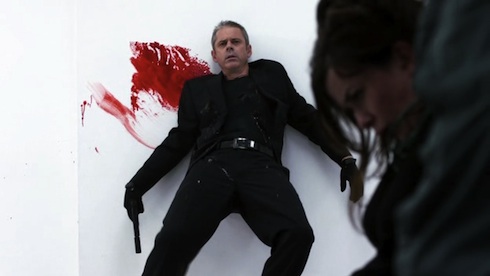It’s somewhat comforting to know that being in Torchwood still means being bad at your job.
The fourth episode of Torchwood: Miracle Day, “Escape to L.A.,” is a middling affair, and wisely focuses on expanding the personal stories of its new members, Esther and Rex, in the midst of Torchwood’s bumbling investigation into the Miracle.
What remains to be seen, though, is whether the show did a suitable job in this regard, or whether it’s too late for us to really care what happens to these people.
Spoilers ahead.
“Escape to L.A.” opens with Torchwood about to depart for L.A. to further investigate pharmaceutical giant PhiCorp’s involvement in the Miracle. Before that happens, Esther Drummond flouts the warnings of both Gwen and Rex and visits her sister before the team departs. Esther’s sister, we quickly find, is crazypants, has always been crazypants, and has now entered the Crazypants Olympics thanks to a fresh heap of paranoia provided by the sudden onset of the Miracle.
Esther’s sister is dragging her two children along on this ride, however, and as she leaves, dodging the incoming crew from A&E’s Hoarders, she makes a heartbreaking, though practical, decision to report her sister to the authorities. Just as Gwen and Rex warned, this instantly tips off the Triangle organization behind the Miracle and a hitman follows Torchwood out to L.A. Big mistake, Esther. Welcome to Torchwood.
We get more news-snippets of how the world is developing in small ways thanks to the Miracle, although at this point these details are so attuned to specific circumstances that I question their placement this far into the series. World-building Miracle Day was necessary for the first few episodes, but if we’re to really have an emotional stake in this story we need to see the consequences of the Miracle affecting characters on a personal level. As we’ll see, “Escape to L.A.” remedies this to some extent, but not nearly as much as it should.
Back in D.C., Dr. Vera Juarez finds herself part of a consortium of medical admins that intend on reopening old hospitals as quarantine centers. Anyone who should be dead but is still kicking gets sent to one location so that the infections preying on their necrotic flesh don’t start infecting the entire population. Juarez is horrified, but like Esther is ultimately practical, and goes along with the plan.
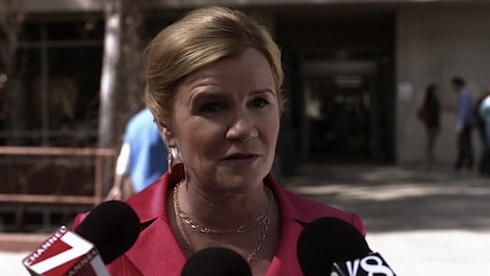
We immediately find out that this division between the living and “the dead” is more than a practical matter, however, as a new player on the scene, the pink pants-suited Ellis Hartley Monroe appears on TV, pulls a Dolores Umbridge, and stresses that she’s very sorry but the people who should be dead should all be herded into camps until they actually die. Her speech includes the words, “segregation,” “afterlife,” “Tea Party,” “camps,” and more, and we watch as she pounds at viewers like Rex, forging her rhetoric into a mighty hammer, a rallying cry that shall appear on posters adorning every possible set: “Dead is Dead.” No quarter is asked, and none is given. Asgard must not fall!
Monroe’s message is so amazingly blunt that we see right through The Pink to the Triangle organization pulling her strings. The question then becomes just why she’s appearing now when PhiCorp already has Oswald Danes carrying the opposite message, that this eternal life is salvation, ostensibly for the Triangle. This won’t be the first indication that PhiCorp and Triangle have different aims.
Jack ponders this all from their new retreat in Venice Beach, pulling a George Eliot Middlemarch quote out of nowhere, about how separate lines can emerge into a pattern as their shadows dance across one another in front of a flickering flame. (That’s not the actual quote. I’m summarizing.) Shortly after watching this episode I ended up randomly sitting next to a woman on the subway reading Middlemarch. So obviously George Eliot is trying to communicate something to me. (But what?) This isn’t the first odd, if entertaining, break in tone that Jack will be responsible for.
Before I continue I just have to point something out. TORCHWOOD HAS A UNICORN.
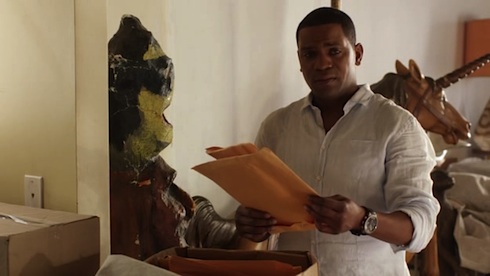
They should name it Myfanwy II.
Anyway, while these threads are pulling together, Rhys won’t stop calling Gwen and Esther won’t stop calling Child Protective Services, reminding us of everyone’s personal stake in this mission. In a similar fashion, we see the near-inhuman smiling machine Jilly Kitzinger finally drop her facade and confess to Oswald just how much he disgusts her. This scene is one of the more engaging pieces in the episode. (And I’m curious if it’s intentional that Lauren Ambrose is costumed in white here and without her coat instead of her usual all-red ensemble.) Both Oswald and Jilly are highly functioning sociopaths, and while the former has considered and rejected redemption, the latter doesn’t seem to realize whatsoever that she should probably be considering the same. Here is where Torchwood: Miracle Day’s characterization begins to shine, and we don’t get to see nearly enough of their interaction.
Meanwhile, Rex disappears for a little bit and makes an unwarranted visit to his jobless, alcoholic father. We realize why Rex is such a career-oriented unapologetic asshole—his anger at his wreck of a father knows no bounds—but we don’t get too much of anything else, and this stalls the emotional build-up of the episode and perhaps the entire series. This scene is where Miracle Day’s characterization totally falters, and it exposes what is probably this show’s biggest flaw, that in a show full of pedophiles, child-killers, PR hounds, and the Welsh, general do-gooder Rex is the least sympathetic person.
“Escape to L.A.” does an alright job at sketching in how the Miracle is affecting our characters emotionally, but the asides regarding Rex and Esther’s families aren’t nearly as effective as they should be and considering that we’re already four episodes into a ten-part series, there’s not a lot of room left to establish these characters. This lack could cripple the show when the stakes are inevitably raised. I haven’t read any spoilers or seen any advance screeners, but I wouldn’t be surprised if we get a gamechanger episode soon, meaning the plot is going to gobble up larger amounts of screen time that could normally be used to flesh out the characters.
The lack of emotional stakes in our new characters leaves the heavy lifting to Gwen’s character, which becomes apparent after Torchwood decides to break into PhiCorp and steal a secure server.
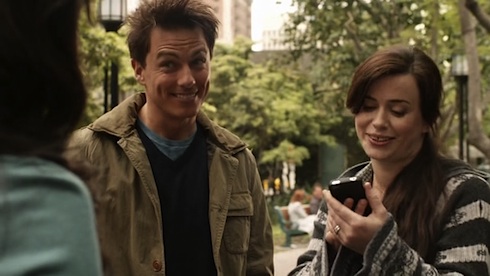
To do this they need the biometric data (retina, handprint, and voice) of the server’s programmer. To do this, she and Jack masquerade as an American couple and in an amazing sequence involving Eve Myles pretending to be American, bump into the programmer out for a walk with his family and “steal” the info with the help of a thermos, baby pictures, and an iPhone. Tonally, the entire sequence is completely out of place within the show, much like the synthesizing of Jack’s meds in “Rendition,” but it’s so fun to watch that you really don’t care.
(Hey, did Jack ever, you know, get rid of the cyanide in his bloodstream? One would think that would be on top of his current to-do list.)
The hitman from the beginning of the episodes watches all of this and deduces Torchwood’s plan. Oddly, the hitman himself can’t access PhiCorp’s server and resorts to cutting off the programmer’s hand and eye, pointing out again that PhiCorp and the Triangle might have separate aims.
Gwen and Jack infiltrate PhiCorp as Rex and Esther run support outside. They spot the hitman going after the former and Rex refuses to pass up yet another chance to be a hypocritical asshole to Esther, having spotted her calling Child Protective Services earlier. “It’s all your fault!” he yells, then runs up to his bedroom and slams the door after the hitman. Rex arrives just in time to shoot the hitman in the throat just as he’s about to reveal who or what the Triangle are. Rex’s mistake covers up Esther’s mistake, but still, mistakes all around. Welcome to Torchwood.
While this is playing out, Oswald refuses to sit idly by while Ellis Hartley Monroe gobbles up his camera time. In one swift move, he crashes the press conference she’s holding outside of Jaurez’s new containment hospital, scrubs up, and enters the hospital. He makes a huge show of walking into a room full of people with lethal wounds who have gone uncared for, and makes a grand speech about how sacred life is, climaxing with a promise about how beautiful it is that they will all live forever while hoisting a baby. Bill Pullman as Oswald pulls off the speech with just the right balance of inspirational grandstanding and pure, creeping sleaze. The press goes apeshit and Monroe’s message is done for.
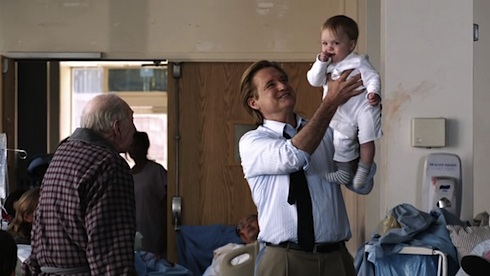
As is Monroe herself when she awakens to find herself trapped in her car as the Triangle speak to her of her impending elimination. She and the car are crushed into a cube, the only thing left being one eye swerving madly within the twisted metal.
Torchwood starts pulling info from the stolen PhiCorp server and discover that PhiCorp has been planning for Miracle Day for years, hoarding painkillers and building “overflow camps” for people like the patients in Juarez’s containment hospital.
And, as we discover from Rhys at the very end of the episode, for people like Gwen’s dad. Miracle Day now has a very real impact on the characters within Torchwood.
But is this enough? Gwen and Rhys are characters we’ve grown fond of over the course of several series of this show, but one expects an event as large as the Miracle to be as potent for all of the main characters, but none of the storylines in this episode deliver the same impact that Gwen and Rhys accomplish in two scant scenes.
Extrapolating outward, it’s obvious that reversing the Miracle means Rex will die, but considering how annoying he is, the impact of that would be pretty small. The Miracle doesn’t seem to affect Esther at all, aside from it maybe tweaking her sister’s already-existing craziness. We don’t even know how the Miracle would affect Juarez, or Danes, for that matter, aside from restoring the models of morality that they’re both comfortable with. Gwen’s stakes are outlined in this episodes, but Jack’s remain elusive. He can die now, but Doctor Who fans know he won’t, so any whinging he might do on wanting to die/not wanting to die remains somewhat superfluous.
The show is bouncing along on fun action pieces and suspense, so far, but that’s going get tiresome over the course of ten episodes. It’s time for the show to really dig into the Miracle, and “Escape to L.A.” doesn’t make me entirely hopeful that the show is going to do that.
Theories & Clues:
We got some cyrptic clues as to the who, what, and why of the Miracle during Monroe’s, er, crunching and the hitman’s monologue. (Adroitly commented on by Gwen: “Oh great he’s cryptic.”) They go as follows:
- Triangle wants Jack dead. PhiCorp does not. (As evidenced in the previous episode.)
- PhiCorp wants every “dead” person in camps and doped up to their eyeballs with painkillers. Triangle wants camps, as well, but doesn’t seem to need the public’s support of them, as evidenced by their dismissal of Monroe.
- Jack gave Triangle something a long time ago that is key to the motivation behind the Miracle.
- Triangle is forging a “new society.” They are “everywhere, always, no one.” Their organization has been in existence a long time and they recently found “a specific geography” which probably allowed them to implement the Miracle. They “once had names.” (This all comes from the hitman, who sure seems to know a lot.)
- Monroe’s actions were revealing Triangle’s hand “a little too soon.” Possible the camps? Possibly that the Miracle is going to end?
- One last cryptic line from Triangle. “Soon the families will rise.” It’s unclear if they mean them or if they mean something they’re creating/assisting.
Theories? “The families” and the fact that the show keeps bringing up Jack’s looooong past seem to imply that we might be dealing with descendants of Mr. Harkness, created knowingly or unknowingly from a lifetime of being Captain Jack Harkness. Maybe they’re immortal and love it, or maybe they’re immortal and hate it. It’s hard to tell, especially since we know from Children of Earth that Jack’s kids age like any normal human. There’s also the fact that the final episode is titled “The Blood Line.”
One development that this episode brought to my mind was the possibility of Rhys taking a fatal wound at some point, forcing Gwen to choose between saving him or the world. It’s hard to tell if Russell T. Davies would do that after the controversy over Ianto in Children of Earth, but I wouldn’t be surprised if it happened. Especially since it now seems Rhys will have to accomplish a daring camp rescue of Gwen’s dad.
Feel free to theorize in the comments below, but try and keep specific spoilers out for episodes past this one. Cast announcements and episode titles are fine, but let’s keep a lid on anything gleaned from set reports or leaked scripts/eps. Thanks!
Chris Lough is the production manager of Tor.com.










